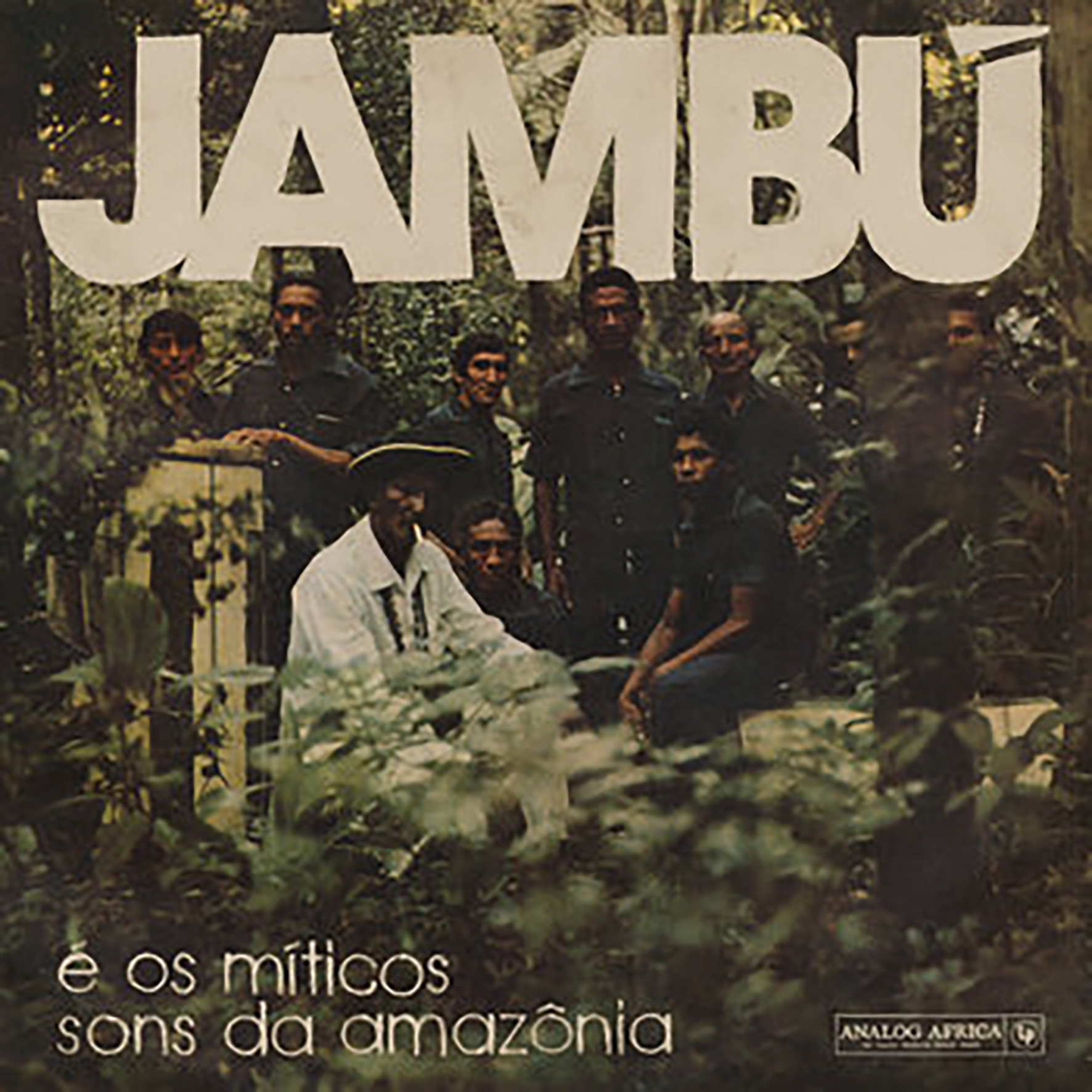"Jambú e Os Míticos Sons Da Amazônia"
 This latest collection from Analog Africa is another detour of sorts, as curators Samy Ben Redjeb and Carlo Xavier headed to Brazil for a very deep dive into the underheard musical treasures of Belém. The genres covered (Carimbó, Samba-De-Cacete, Siriá, Bois-Bumbás and bambiá) were all entirely new to me, but I felt better when I learned that they were all fairly new to Redjeb as well. Characteristically, however, he was drawn to the Amazon-bordering coastal city due to its unique collision of cultures and therein lies the African connection: Belém was a crucial port for the sugar, coffee, and rubber trades, which resulted in plenty of West African slaves being sent to the region. Those that managed to escape often fled to outlaw settlements called quilombos where African religions and cultural traditions established a tenacious foothold (including those of Redjeb's beloved Benin). Naturally, those cultures evolved into something unique over the years and the best pieces on Jambú capture quite a wonderful marriage of relentlessly propulsive Brazilian grooves and African rhythms (though the latter is not quite as prominent as I would have expected).
This latest collection from Analog Africa is another detour of sorts, as curators Samy Ben Redjeb and Carlo Xavier headed to Brazil for a very deep dive into the underheard musical treasures of Belém. The genres covered (Carimbó, Samba-De-Cacete, Siriá, Bois-Bumbás and bambiá) were all entirely new to me, but I felt better when I learned that they were all fairly new to Redjeb as well. Characteristically, however, he was drawn to the Amazon-bordering coastal city due to its unique collision of cultures and therein lies the African connection: Belém was a crucial port for the sugar, coffee, and rubber trades, which resulted in plenty of West African slaves being sent to the region. Those that managed to escape often fled to outlaw settlements called quilombos where African religions and cultural traditions established a tenacious foothold (including those of Redjeb's beloved Benin). Naturally, those cultures evolved into something unique over the years and the best pieces on Jambú capture quite a wonderful marriage of relentlessly propulsive Brazilian grooves and African rhythms (though the latter is not quite as prominent as I would have expected).
As is this case with all Analog Africa compilations, the tales told in Jambú's liner notes are every bit as intriguing and colorful as the actual music (sometimes even more so).In this case, the story mostly takes place in November 2012, as Xavier and Redjeb arrived in Belém for a month of scavenging for rare and forgotten records and the even harder-to-find musicians that made them.Redjeb was primarily searching for work by Mestre Cupijo, who was responsible for revolutionizing the quilombo-descended Siriá style through the incorporation of mambo and merengue influences.The "first ever recording of modern Siriá" ("Despepida," recorded in 1973) is included here as the album's closer and it is indeed quite a striking piece, resembling a sultrier, sexier take on big band mambo.Sadly, Redjeb did not get to interview Cupijo, who had just passed away a few months before, but he did find some great albums and meet some unique people.And the search began in a similarly unique place: the Ver-o-Peso, which is purportedly the largest open-air market in South America.Redjeb describes it as "the pounding heart of the city," but also notes the "unbearable heat," "excruciating smell," and the "hundreds of disturbed vultures loudly arguing over a piece of rotten meat."I was similarly charmed by the description of one of the record dealers the pair encountered who would spend hours "restoring" record covers with pen, pencil, and brush because "a good cover would considerably increase the price of the record."
Aside from Cupijó, Redjeb singles out a trio of other artists who had a profound impact in modernizing the music of the region: Verequete, Orlando Pereira, and Pinduca.While Pinduca’s opening "Vamos Farrear" unquestionably boasts one of the album’s most insistent and smoldering grooves, it did not strike me as particularly unusual (it is just extremely good).The other two artists, on the other hand, are a much more eclectic and revelatory find.Verequete, in particular, is by far my favorite artist on the album.A former butcher and lumberjack with a nickname borrowed from "a vodun (divinity)" in "the jejes-nagos cults of Mina," Verequete was devoted to traditional styles of Carimbó.Apparently, that is what I am into, as the two Verequete pieces on Jambú are raucously thumping and clattering percussion workouts with little more than a banjo and a saxophone as accompaniment."Da Garrafa uma pinga" is probably the most wild and fun song on the album.Orlando Pereira's work, on the other hand, is a bit more hooky and musical, but no less vibrant.Also, the percussion unexpectedly shares the focus with some great flute solos and organ motifs.The latter is especially usual, as the less-than-ideal availability of electricity in the region is a recurring theme in the interviews with the artists.Aside from the four central visionaries anchoring the album, a few other artists make strong impressions simply by virtue of impressively tight and explosive ensembles.Os Muiraquitãns' "A Misturada" is especially wonderful, as it is a stomping and throbbing party of a song.Almost everything on the album is strong and distinctive in some way though, as only a couple of Pinduca's more funk-influenced pieces leave me cold.
Aside from the music, Jambú is also noteworthy for featuring the single craziest touring story that I have ever heard: as he was buying an Os Muiraquitãns record, Redjeb was informed by a record dealer that most of the band had perished in a boating accident that likely involved a drunken captain.When Redjeb met the band's Clorio Margahlo several years later, "the very surprised and amused" artist corrected the record: they had actually been riding to a gig in the back of a city council-provided dump truck (driven by drunk man with no dump truck license), but the end result was roughly the same.Fortunately, most of the band members had wisely decided to hitchhike to the show instead, so the casualty total could have been much higher than it was.While that tragedy is an extreme case, the varying fortunes of the artists that burned brightest in that mostly unknown regional scene make for fascinating and occasionally heartbreaking reading.For example, Verequete got repeatedly burned by record labels and had to abandon music to devote himself to selling barbequed food, while Mestre Vieira's death resulted in thousands of fans flooding the streets for a cacophonous funeral procession of blaring music and car horns.Knowing things like that definitely deepens my connection to this music and I love Redjeb for uncovering such biographical background–I cannot think of any other label that rivals Analog Africa in providing such a compelling and vivid musical history for each fresh release.As for the music itself, Jambú is not quite as revelatory as some of Redjeb's other collections, but it is quite a solid release packed with good songs and I will certainly be digging deeper into Verequete's oeuvre.Analog Africa remains the gold standard for international music compilations.
Samples can be found here.



